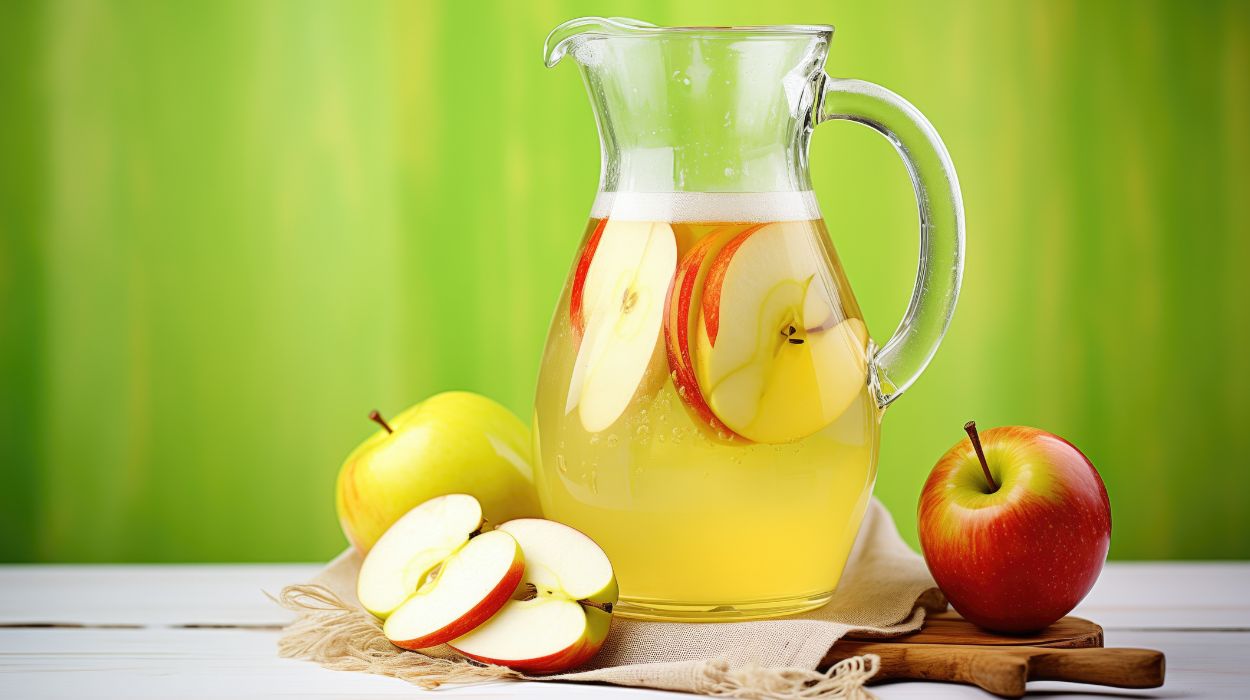Apple cider vinegar has gained popularity recently for its potential health advantages. Have you ever wondered, “How can I take apple cider vinegar?” but you’re unsure where to start?
This comprehensive guide will explore how to drink apple cider vinegar in seven easy and tasty ways. From refreshing morning drinks to smoothies, drinking apple cider vinegar offers a spectrum of possibilities to suit you. We’ll also look at the scientifically supported health benefits ACV may provide you with.
We’ll offer guidance on how you drink ACV daily, emphasizing the importance of starting conservatively and gradually adjusting doses based on personalized approaches. Finally, we’ll uncover some potential side effects so you can make informed decisions when incorporating it into your lifestyle.
Ready to learn more about ACV and how to drink it? Let’s get started!
How To Drink Apple Cider Vinegar
Discovering how to consume apple cider vinegar can offer many purported health benefits. There are seven easy ways to incorporate it into your routine.
- Mix it with water.
- Add it to fruit or vegetable juices.
- Create salad dressings and sauces.
- Boost your favorite tea.
- Simple shot.
- Add it to soups and stews.
- Amplify smoothies.
Start with smaller amounts, gradually increasing to one that suits your preferences.
Seven Best Ways To Drink Apple Cider Vinegar

Discovering how to take apple cider vinegar can be both delicious and beneficial. Here are eight easy ways to consume apple cider vinegar and things to do to ease its incorporation.
Mix With Water
Start your day by mixing one to two tablespoons[1] of ACV with a glass of water to create diluted apple cider vinegar. Adjust the ratio to suit your preferences. This is one easy and quick way to add ACV to your daily routine.
Add To Fruit Or Vegetable Juice
Transform your favorite fruit juices, such as apple juice, by incorporating a splash of ACV. This not only enhances the flavor but adds a tangy twist.
Begin with one tablespoon[1] and adjust according to your liking. Experiment with different juice combinations to find your perfect blend.
Make Salad Dressings And Sauces
Elevate your salads by creating a delicious salad dressing using ACV. Mix it with olive oil, a touch of honey, and your preferred herbs and spices. Aim for a ratio of one part vinegar to three parts oil, adjusting to suit your taste.
Improve the flavor profile of your sauces by adding ACV. Whether it’s a barbecue sauce, a stir-fry glaze, or a savory dip, adding a splash of apple cider vinegar can bring a lovely tanginess. Begin with a teaspoon and adjust the quantity based on your taste preferences.
Boost Your Tea
Enhance your favorite tea by adding a teaspoon of ACV. This works well with herbal teas, green teas, or even a warm cup of hot water with lemon juice. Experiment with different tea varieties to find a combination that suits your palate.
Simple Shot
Simply shoot one to two tablespoons of ACV in a little water down quickly. If the flavor is too intense for you, use more water or a sweetener like honey to make it more palatable.
Add To Soups And Stews
Give your soups and stews an extra kick by adding a splash of ACV. Start with a teaspoon and adjust in line with your preferences.
Amplify Your Smoothies
Improve the nutrition of your smoothies by adding ACV. Blend it with fruits, vegetables, and a liquid like milk or water.
Begin with a teaspoon and adjust as needed. The acidity can complement the sweetness of your smoothie ingredients.
If you don’t want to drink ACV because of the taste, ACV gummies offer a convenient alternative. These chewable supplements provide a way to incorporate ACV benefits into your daily routine without compromising on taste.
Benefits Of Apple Cider Vinegar

Drinking ACV may offer a range of potential health benefits supported by scientific studies. Let’s explore these further.
Blood Sugar Regulation
Scientific evidence suggests that incorporating ACV into your routine may benefit blood sugar regulation. Maintaining stable blood sugar levels is crucial for overall health as it helps sustain consistent energy levels, supports cognitive function,[2] and reduces the risk of diabetes.[3]
Firstly, ACV may help prevent blood sugar spikes after meals. One study found that people who drank ACV daily had more stable blood glucose[4] levels after eating a meal than those who didn’t. This could be because the ACV interferes with the digestion of starches, slowing down the conversion of complex carbohydrates into sugars.
Research has explored the potential of ACV in improving insulin sensitivity.[1] Improved insulin function can enhance the body’s ability to regulate blood sugar effectively. While more research is needed to understand the mechanisms for insulin sensitivity fully, early research shows promising results.
Weight Loss
Research suggests that ACV may play a role in supporting weight loss through various mechanisms. While it’s not a miraculous solution, incorporating ACV into a healthy lifestyle, with plenty of fruit and vegetables, may offer some fat loss benefits.
The acetic acid in ACV may increase feelings of fullness and satiety. In one study, people who drank more vinegar-containing vinegar acetic acid had greater feelings of fullness[5] than those who drank less. Drinking it before meals might help control appetite, potentially leading to reduced overall calorie intake.
More stable blood sugar levels are linked to better weight management.[6] ACV’s potential to influence glucose metabolism could contribute to more controlled insulin responses, potentially reducing the chance of cravings and overeating.
Some studies have explored the potential of apple cider vinegar in reducing body fat mass.[7] However, this evidence is limited, and the results vary amongst studies.
While knowing how to drink apple cider for weight loss is good, it’s not a substitute for a healthy diet and regular exercise. Rather, it may serve as a complementary addition to a holistic approach to weight loss. Responses will vary from person to person, and it’s recommended to consult your healthcare provider prior to making any major dietary changes.
If you want to drink it in its purest form without any additives or sugars, you can easily make it at home. Simply crush some apples for the juice and let it ferment in alcohol first and then vinegar. Strain, ferment, and enjoy! It’s recommended to start with smaller amounts and gradually increase as you become accustomed to the taste.
Digestion
Taking apple cider vinegar may improve digestion and gut health through several potential mechanisms.
One study found that ACV supplementation boosted the production[8] of digestive enzymes. These enzymes play a crucial role in breaking down food in the digestive system, promoting efficient nutrient absorption.
Research has explored the use of ACV to relieve symptoms of indigestion,[9] such as heartburn and acid reflux. Its effects may help neutralize stomach acid, providing relief for people experiencing occasional digestive discomfort.
The acidity of ACV may contribute to maintaining a balanced pH level[10] in the digestive tract. A balanced environment is essential for the proper functioning of digestive enzymes and the absorption of nutrients.
Heart Health
Consuming ACV may support heart health through various mechanisms.
Some research indicates that ACV may help improve lipid profiles[1] by reducing levels of cholesterol and triglycerides. These changes are associated with a lower risk of cardiovascular issues.
Early research suggests that ACV may play a role in blood pressure regulation. One study found that regular consumption contributed to modest reductions[11] in both systolic and diastolic blood pressure, supporting cardiovascular health.
The antioxidants found in ACV, such as polyphenols, may help combat oxidative stress[12] in the body. Oxidative stress is linked to inflammation and cardiovascular issues, and incorporating ACV into your diet may help combat it. However, the current evidence is limited to animal studies, and further research is required in humans.
Whilst the scientific research provides interesting insights, individual responses vary. It’s always best to speak to a healthcare professional before making any significant dietary changes.
How Much Apple Cider Vinegar Should You Consume A Day?
Determining the optimal amount of ACV to consume daily requires a thoughtful and individualized approach. So, how do you drink ACV daily? While scientific studies provide insights into potential health benefits, it’s crucial to consider factors like personal tolerance, health goals, and underlying conditions.
Here are some general guidelines to help you navigate how much ACV to drink.
Start Small
If you’re new to consuming ACV, begin with a small amount, such as one teaspoon to one tablespoon per day. This allows your body to adapt to the acidity and minimizes the risk of digestive discomfort.
Gradual Increase
If you tolerate ACV well, try gradually increasing the amount to two tablespoons per day. You should spread your intake throughout the day, perhaps incorporating it into different meals or drinks.
Consider Dilution
To counteract the strong taste and acidity of ACV, consider diluting it in water or other drinks. A common dilution ratio is one to two tablespoons of ACV in a large glass of water.
Monitor Your Response
Pay attention to how your body responds to the intake of ACV. Some people may experience gastrointestinal discomfort or irritation, in which case adjusting the quantity or discontinuing is advisable.
Consult With A Professional
Your needs may vary based on health conditions, medications, and personal goals. Speak to a healthcare professional to receive personalized guidance on the appropriate amount of ACV for you.
It’s crucial to emphasize that more is not necessarily better regarding ACV. Moderation and consistency are key, and ACV should be added to a balanced diet and healthy lifestyle.
Are There Any Side Effects?
While ACV is generally considered safe, there are some potential side effects you should know about.
Some people may experience digestive issues such as bloating, gas, or an upset stomach. This can be especially true if taken on an empty stomach or in large amounts. Starting with a small quantity and gradually increasing it can mitigate these effects.
The acidity of ACV can potentially erode tooth enamel over time. To minimize this risk, consider reducing your intake of undiluted apple cider vinegar and diluting it in water instead. Use a straw and rinse your mouth with water after consumption.
As mentioned previously, ACV may impact blood sugar levels, which means it could interfere with diabetes medications. If you’re taking these medications, speak to a healthcare professional before adding ACV to your routine.
While rare, some people may be allergic to components in ACV. Any signs of an allergic reaction, such as swelling, itching, or difficulty breathing, should be addressed immediately by a doctor.
Conclusion
You’re not alone if you’ve wondered, “How do you drink apple cider vinegar?” ACV has gained attention for its potential benefits.
Drinking apple cider vinegar can add a tangy twist to your meals and a range of health benefits. It may enhance digestion, support glycemic control, improve heart health, and aid weight loss.
However, it’s crucial to approach ACV consumption with thoughtful consideration. Moderation and gradual incorporation are key, especially if you are new to consuming it. Make sure to monitor your body’s reactions and adjust quantities accordingly.
Frequently Asked Questions
There is no definitive answer. Some people prefer to boost their morning water or tea, while others prefer to add it to their evening meal. The key is finding a time that suits you and your body’s response.
The choice depends on personal preference. Dilution and moderation are key for a positive experience, regardless of water temperature.
While studies have found that ACV may support weight loss, it’s not guaranteed to reduce belly fat. It may promote feelings of fullness and control appetite, but lifestyle factors like diet and exercise play crucial roles in belly fat loss.
Results will vary. Some may notice changes in a few weeks, while others may take longer. Consistent consumption, combined with a healthy lifestyle, improves the likelihood of experiencing benefits over time.
 Evidence Based
Evidence Based